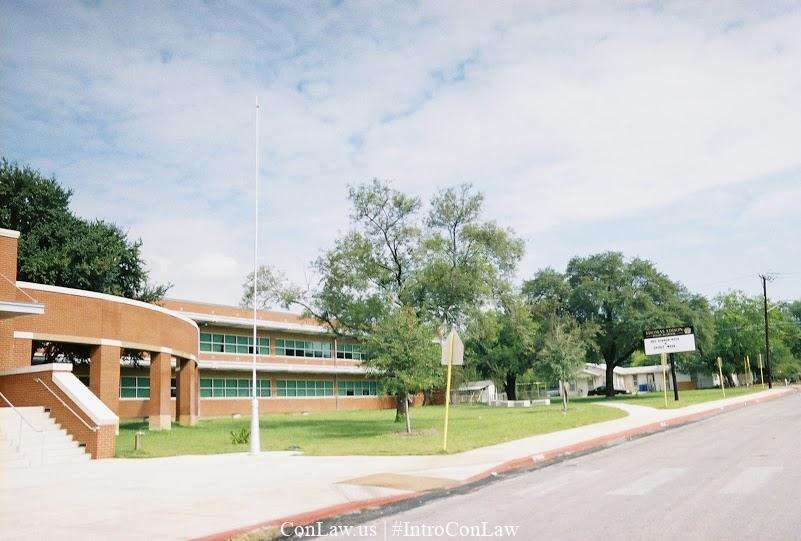The Volokh Conspiracy
Mostly law professors | Sometimes contrarian | Often libertarian | Always independent
Today in Supreme Court History: November 8, 1994
11/8/1994: U.S. v. Lopez argued.

Editor's Note: We invite comments and request that they be civil and on-topic. We do not moderate or assume any responsibility for comments, which are owned by the readers who post them. Comments do not represent the views of Reason.com or Reason Foundation. We reserve the right to delete any comment for any reason at any time. Comments may only be edited within 5 minutes of posting. Report abuses.
Please to post comments


Sub silentio abrogating Katzenbach v. McClung, 1964. Yes, Mr. Clarence Thomas, restaurants can shut the door in your face because you’re black. Glad you agree.
McClung shows the utter absurdity and unworkability of the uber-federalist, libertarian (?) reading of the Commerce Clause. He certainly served a significant number of inter-state traveling customers (and with a significant amount of inter-state shipped products). So should he have been able to discriminate against a Birmingham resident ordering something he got locally but not a Georgian stopping on his way through ordering something he had shipped in? Would he have to label which ingredients were locally sourced and therefore exempt to serve on the menu? Check driver's licenses to see who he could discriminate against?
I mean, that's not the federalist (or "uber-federalist") argument, no. The argument is that a retail sale (well, at least an in person one) is not interstate commerce. Doesn't matter where the person came from or where the ingredients came from. The customer's travel itself may be interstate commerce, and thus may be reachable by the federal government, but that doesn't give the federal government any power over a local retailer he does business with. Similarly, the federal government may be able to regulate the shipment of those ingredients across state lines, but that has nothing to do with the local sale.
The "uber-federalist" reading is that the interstate commerce clause provides for the regulation of interstate commerce, not local things that may have an effect on interstate commerce.
A person traveling from Georgia to Alabama who stops and gets BBQ is not engaged in 'inter-state commerce?' I mean, I guess MLB is not engaged in inter-state commerce because, hey, when the Sox play the Yankees it's not on the border!
A big impetus for the CRA was in MLK's 'Dream' speech where he talked about weary African-American travelers turned away from hotels. I mean, I guess we could say, hey, that traveler from Indiana trying to get a hotel room in Alabama is totally Alabama business...
I mean, this person's travel itself might be described as interstate commerce. But that doesn't mean one can aggregate all the things he does along the way and say that each one of them is also interstate commerce. His buying ribs at a restaurant in Birmingham is an isolated, intrastate transaction. As you yourself said, it wouldn't make any sense to say that this is interstate commerce but the guy who lives across the state engaging in the exact same transaction is not.
Now, if he placed a DoorDash order to bring him ribs from this Birmingham restaurant to his home in Atlanta, that would be a different story.
The Supreme Court agrees with you!
It's hard to see how saying that the federal government can't regulate non-commercial activity with no interstate hook "abrogates" Katzenbach. I mean, it obviously didn't do that, so empirically you're wrong.
Right. The Court treats economic and non-economic activity different. That's not really surprising (whatever I think of modern Commerce Clause doctrine), because the clause is clearly a mandate for the federal government to regulate economic matters.
Forbidding the transport of items traded in interstate commerce into certain areas is "regulating" commerce.
Unless you mean that the transport is part of the purchase transaction, no it isn't. If you mean that, yes: if I order something from a store in Texas to ship to me, then regulating that shipment is regulating interstate commerce. But if you're talking about the Lopez situation and mean that the item was once transported in interstate commerce, then no, it's not. It's regulating non-commercial things that happen after the commerce took place.
If people weren't actively trying to expand the federal government's jurisdiction, your claim would rightly be seen as absurd. "Rearranging your furniture in your living room is commerce because that furniture was originally built in Minnesota and shipped to a store in Connecticut where you bought it."
Oops. I forgot that clicking on the link to the case doesn't actually get you to a discussion of it, but just takes you to an ad for B&B Enterprises.
Do these guys pay Reason?
I got the discussion when clicking...
Yeah, Bernard; I'd check your computer out because it goes to the case page.